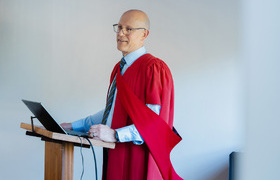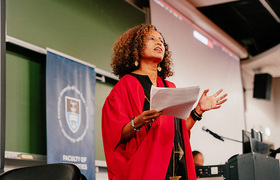Exploring politics of knowledge and belonging in Africa’s universities
12 November 2025 | Story Morongoa Mothiba. Photo Robyn Walker. Read time 4 min.
Professor Suren Pillay, the director of the Centre for African Studies and holder of the AC Jordan Chair in African Studies at the University of Cape Town (UCT), delivered his inaugural lecture, titled “The Eye Crosses the River Before the Body: Being and Becoming African in the University” on 21 October 2025.
The lecture traced Professor Pillay’s intellectual and activist journey through three decades of scholarship, interrogating the legacies of colonialism, political violence, and the ongoing project of decolonisation in higher education.
In her introduction, Deputy Vice-Chancellor for Transformation, Student Affairs and Social Responsiveness Professor Elelwani Ramugondo described Pillay as “a scholar whose work insists that freedom must first be imagined before it can be realised; that our eyes must cross the river before our institutions can follow”.
To be and become African
In his lecture, Pillay examined what it means to be and become African in the contemporary university, arguing that the question of decolonisation remains unresolved in South Africa’s post-apartheid landscape. “Settler colonialism,” he said, “is not an unfinished story of the past – it continues to shape how we know, teach, and imagine the world.”
Reflecting on his formative years in Athlone during the turbulent 1980s, he recounted how the political ferment of that era ignited a lifelong commitment to critical inquiry. “We debated whether liberation should come before education or through education,” he recalled. “Those questions have stayed with me, because they are ultimately questions about imagination; about how we see the world and our place within it.”
“Colonialism named and classified the world in ways that made domination appear natural.”
That commitment has since guided an influential body of scholarship spanning political violence, citizenship, justice, and the politics of knowledge production. As principal investigator of the Mellon Foundation’s “Other Universals” project, Pillay led a consortium of universities across Africa, Asia and the Caribbean, building intellectual networks that challenge Eurocentric frames and reimagine knowledge from postcolonial locations.
Decolonising the university
In his address, he explored how colonialism’s enduring power lies not only in its conquest of land, but in its conquest of meaning. “Colonialism named and classified the world in ways that made domination appear natural,” he said. “To decolonise is to reclaim the right to define ourselves, for ourselves.”
Drawing on the ideas of thinkers such as Mahmood Mamdani, Aimé Césaire and Samir Amin, Pillay tabled three propositions for the decolonisation of the university: undoing Eurocentrism in knowledge systems, deracialising institutions while resisting colonial repetition, and fostering a Pan-African intellectual solidarity that resists both isolation and xenophobia.
“The challenge before us is to imagine universality anew, from Africa outward.”
“Deracialisation without decolonisation leaves Eurocentrism intact,” he warned. “And decolonisation without Pan-Africanism risks becoming nativism. The challenge before us is to imagine universality anew, from Africa outward.”
From reflections on the Rhodes Must Fall movement to his analysis of global structures of knowledge, Pillay urged scholars and students to embrace intellectual courage. “Students reminded us that decolonisation is not about erasing history,” he said, “but about freeing the imagination from the boundaries history has built.”
Following the lecture, Professor Tshepo Madlingozi of the South African Human Rights Commission delivered a vote of thanks, commending Pillay for his clarity and conviction. “Few scholars have illuminated so powerfully the relationship between belonging and knowledge,” he said. “This lecture reminds us that the pursuit of justice and the pursuit of knowledge are inseparable.”
 This work is licensed under a Creative Commons Attribution-NoDerivatives 4.0 International License.
This work is licensed under a Creative Commons Attribution-NoDerivatives 4.0 International License.
Please view the republishing articles page for more information.










